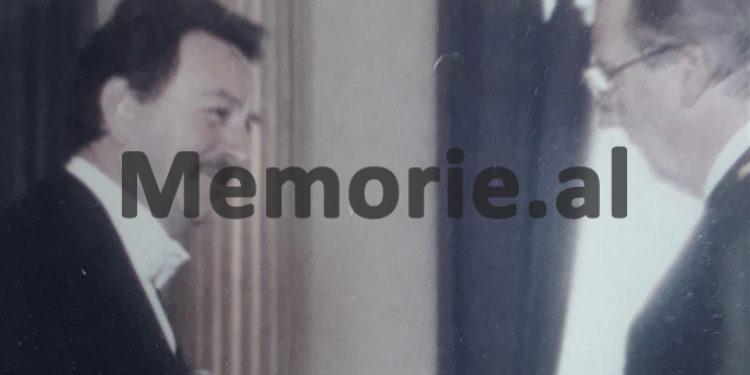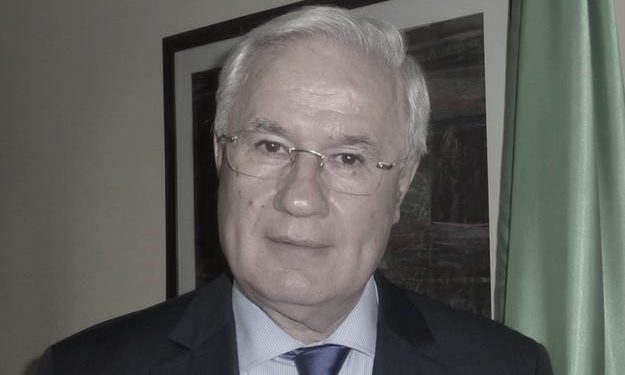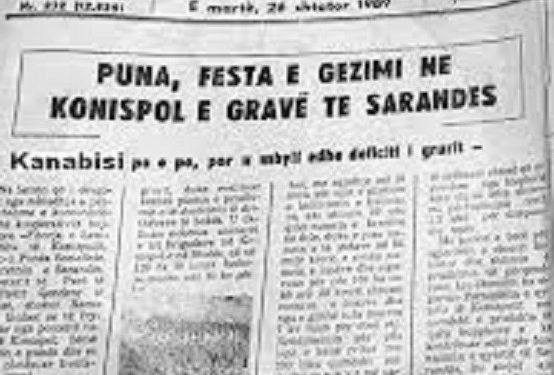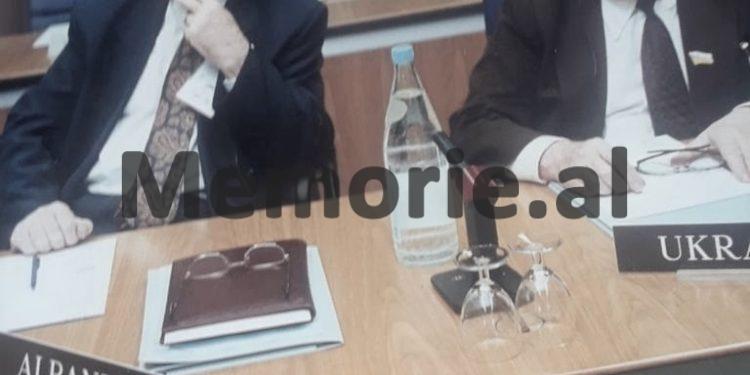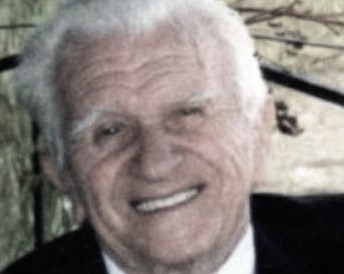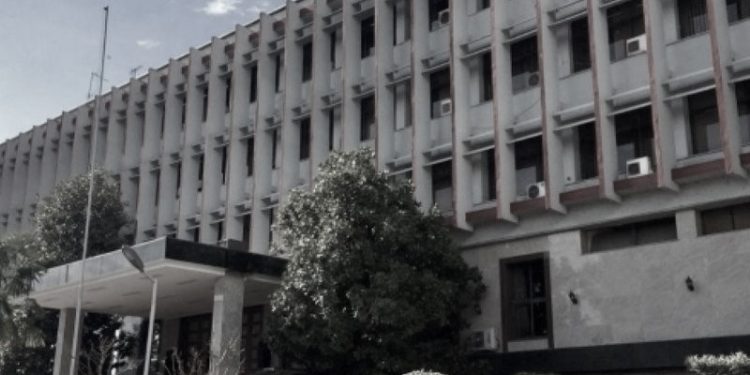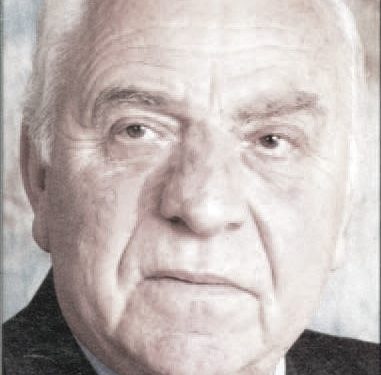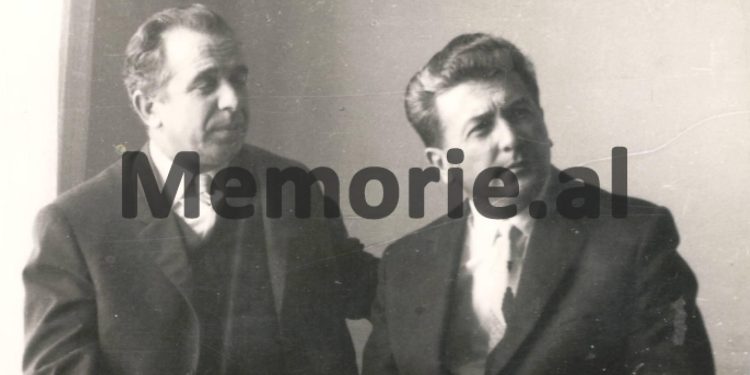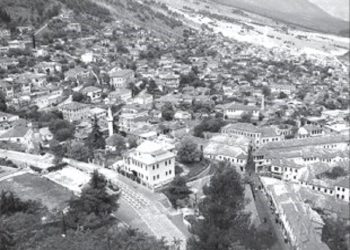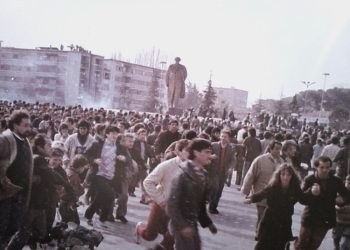By Bashkim Trenova
Part twenty-four
Memorie.al publishes the memoirs of the well-known journalist, publicist, translator, researcher, writer, playwright and diplomat, Bashkim Trenova, who after graduating from the Faculty of History and Philology of the State University of Tirana, in 1966 was appointed a journalist at Radio- Tirana in its Foreign Directorate, where he worked until 1975, when he was appointed journalist and head of the foreign editorial office of the newspaper ‘Zeri i Popullit’, a body of the Central Committee of the ALP. In the years 1984-1990, he served as chairman of the Publishing Branch in the General Directorate of State Archives and after the first free elections in Albania, in March 1991, he was appointed to the newspaper ‘Rilindja Demokratike’, initially as deputy / editor-in-chief and then its editor-in-chief, until 1994, when he was appointed to the Ministry of Foreign Affairs with the position of Press Director and spokesperson of that ministry. In 1997, Trenova was appointed Ambassador of Albania to the Kingdom of Belgium and to the Grand Duchy of Luxembourg. Unknown memories of Mr. Trenova, starting from the war period, his childhood, college years, professional career as a journalist and researcher at Radio Tirana, the newspaper ‘People’s Voice’ and the Central State Archive, where he served until the fall of the communist regime of Enver Hoxha, a period of time when he in different circumstances met many of his colleagues, suckers of some of the ‘reactionary families’, etc., whom he described with a rare skill in a book of memoirs published in 2012, entitled ‘Enemies of the people’ and now brings them to the readers of Memorie.al
Continued from the previous issue
“Enemies of the people”
My departure from Radio Tirana with the order of Kiço Pandeli and the approval of Thanas Nano!
When I was in Uznova, Berat, to complete a three-month training course as a reserve officer, on February 24, 1970, I received a letter from Lulzim Hana, my friend and colleague in the Foreign Radio’s East Editorial Office. He concluded this letter by writing: “I can tell you at last, that your revolutionary spirit and consistency in your principles, has not disappeared and follows your opponents as a shadow. I wish your health and good service – Luli “. After so many years, the directors of the Radio, it seems, could no longer bear even my shadow in this institution. My three-year departure from Radio to complete the Party candidate’s internship was a good opportunity for them to settle accounts with me by slamming the door in my face.
Seeing that I was not being hired at the Foreign Radio, Klimi Misja, director of the Internal Radio, proposed that I move to the Information Office, which was under his Directorate. Klim had no obligation to me, neither as a journalist nor as a communist. I had not worked a single day at Home Radio. There were others who had these obligations and sought to avoid them, throwing a communist on the road to unemployment!
My engagement in the Newsroom, however, was not secure. Thanas Nano had not returned yet and with his return the continuation as editor for international events in this Editorial Office, could be questioned. Kiço Pandeli was not one to make decisions without first talking to Thanas Nano. In Kiço’s decision, Thanas’s decision was seen.
Today I laugh when I remember how in the beginning of my work as a journalist in Radio Tirana, when it was raining, Thanasi got in his car of the Soviet brand “Pobjeda”, two or three employees of Radio, who lived near his house. At the front door of the Radio he, before going out, glanced and nodded to the persons, who chose to make their way with him. He had chosen me several times as such a privileged “passenger”. I was not fortunate enough to be a permanent “privilege” in the rainy season. Very soon, though our houses were always close by, I would be invisible to the general manager, my neighbor. He would not shake his head anymore to say “come on, it’s raining”. This meant: “With the head you have, you deserve to get wet in the rain, even fall in the hail.” This meant that I, at least, was one of those who did not like him.
“ZERI I POPULLIT”
While I was working at the Information Office, one day I was called by Fatmir Kumbaro, a friend of mine, who worked at the Foreign Office at “Zeri i Popullit”, a body of the Central Committee of the Labor Party. “Zeri i popullit” was the most important newspaper of the time in Albania, the spokesperson of the dictatorship. Fatmir tells me that he had talked to the editor-in-chief, Xhelil Gjoni, and that he wanted to meet with me to talk about the possibility of my employment in the Foreign Office of the newspaper. I immediately met Xhelil Gjoni. He proposed to me to start working “tomorrow” in “Voice of the People”. I accepted with great desire and gratitude the new post that was offered to me. After leaving Xhelil Gjoni, I met with the secretary of the Collegium of “Voice of the People”, Shaban Hidrin. It was my first meeting with him, but we talked as if we had known each other for years.
At that time, every journalist dreamed of working for “Zeri i Popullit”. This newspaper was the only one with full authority, the only one that spoke on behalf of the Party, the only one that was taken as a point of reference and orientation by all means of the press and propaganda. The “Voice of the People” was the only newspaper of the time, read every morning by the dictator, the only one that made both ‘David’ and those close to ‘Goliath’ tremble. Articles published in this press could make a hero, a general, or throw him into the abyss, to be forgotten as never before in this life. I had previously collaborated with the “Voice of the People”, I had occasionally published political articles on its fourth page, where international issues were addressed.
After the conversation with Xhelil Gjoni, I returned to Radio Tirana. I met again, for the last time, the director of Foreign Radio. I told him that I had gone to share with him, since I would start working in “Zeri i Popullit”. “It is not true,” he told me. I held out my hand as if to say: we have nothing more to talk about. He told me: “I will not shake your hand. You want to put pressure on me, since I did not appoint you to work”! I do not know if he really did not believe me or just did not want to shake my hand. In the end, I said to him: “As you wish, even if you do not give me your hand, I will start working at” Zeri i Popullit “tomorrow. So I left him and Radio Tirana, with which I was connected the first years of my life as an independent, the creation of my personality as a journalist, my utopian and naive ideal as a communist, the years of youth, which begins she also leaves, of unforgettable friends and comrades, with whom even now, after about 35 years, I have not parted.
Ajet Simixhiu was the Editor-in-Chief of “Zeri i Popullit” as its head and at the same time as the deputy editor-in-chief of the newspaper. Ajeti was an old press employee. He had been the director of the Albanian Telegraphic Agency. He came to “Zeri i Popullit” after serving as Albania’s ambassador to Egypt. I worked with him for about a year. He left the newspaper and joined the working group with Enver Hoxha. It seems to me that he dealt with the letters, which reached the dictator. Save the best impressions of him. I last met him on the street, after I had passed to the “Democratic Renaissance”. Normally, cadres who knew me and who had worked in positions such as that of Ajeti, in the Central Committee of the Party, or in working groups close to the dictator, had not welcomed my engagement in the ranks of the democratic opposition, were also expressed in words like: “Traitor” and the like. The verse, as soon as he saw me, smiled at me and hugged me, hugging me tightly on the shoulders. He did not say a word to me about the “Democratic Renaissance”, but his kindness made it clear that he either agreed with my choice, or at least valued it as my right, as something that had no reason to put up barriers between colleagues, friends and acquaintances. Ajet Simixhiu had come as the head of the Foreign Sector in “Zeri i Popullit” after Jusuf Alibali was expelled from there.
The expulsion of Yusuf Alibali from “Zeri i Popullit”!
Jusufi had been a member and senior cadre of partisan formations, until the complete liberation of the country from the invaders. In the following years, he will become Deputy Minister of Justice and a member of the Supreme Court. Passionate about journalism, he also works as the head of the Foreign Sector at “Zeri i Popullit”. Jusuf Alibali is also the founder and first editor-in-chief of the magazine “Albania Today”. He is also the co-author of “History of Albania”, for which he received the “Award of the Republic”. Jusufi has also received the titles of docent and professor. His work includes about 500 titles in the field of justice, history and literature.
Neither he nor anyone from his family or his wife, Adivija, had done anything against the regime, however, in 1975, they were interned for about 13 years in the villages of Gjirokastra and Berat. Friends and colleagues were forced to “forget” them. Only in the darkness of the night would a villager approach their apartment to give them something to keep them alive. I knew Adivije and her sisters, Yllka and Sakine, I had almost had neighbors. All three were beautiful girls, ballerinas at the Opera and Ballet Theater. I also remember Adivie as an actress in one of the main roles of the first Albanian film, more precisely the Soviet-Albanian, “Skanderbeg”. She was forced to collect chamomile, which she sold for a living.
Jusufi and his family were interned simply because a wife or niece of his wife was married to one of Beqir Balluku’s sons, a former member of the Politburo and Minister of National Defense. Beqir Balluku was executed by the dictatorship in November 1975, after being accused of “high treason”. Yusuf was only convicted that from the woman’s family, they made a marriage with a member of the Politburo, a minister, for whom they had no way of knowing that after a few years, he would be shot as a traitor!
The expulsion of Paskal Milos from “Zeri i Popullit”, after the punishment of his brother, as an enemy!
My achievement in “Zeri i Popullit” is somewhat similar to that of Ajet Simixhiu. In the Foreign Sector of this newspaper I went to the place of Pascal Milos. He was fired from here, even from Tirana, and sent, as far as I can remember, as an employee of the Fier Museum, a small town in southern Albania. Paskali was at that time a young boy, 26 years old. In my view, he was a pretty good Foreign Sector journalist. His articles caught the reader’s attention. Then why did they remove Pascal Milon from “Voice of the People”?
The dictatorship condemned Pascal’s brother in 1975 as a saboteur and enemy. If I am not mistaken, he previously worked at the Petroleum Institute in Fier. However, he worked in a sector that had to do with the design of oil wells or its extraction. This was also the misfortune of him and many of his colleagues. In 1975, about 30 geologists were arrested, shot, convicted and expelled from the Petroleum Institute in Fier. These were the most experienced and qualified geologists, who directed all the scientific work at the Institute. Among them was Pascal Milos’s brother. Having a brother convicted by the Party, Paskali was no longer suitable to work as a journalist in the body of the Central Committee of the Party, in the newspaper “Zeri i Popullit”. Thus, at the age of 26 he, completely innocent, was convicted of an unfulfilled guilt even by his brother.
I had known very little about Pascal. I had met him on several occasions in the Foreign Sector. I had not cooperated with him. After starting work at the Museum of Fier, he came to Tirana from time to time. At first he also returned from the Foreign Sector of “People’s Voice” and proposed an article for publication. We were instructed by the editor-in-chief not to accept Pascal articles. He was deprived of the right to publish in “Zeri i Popullit”. This, of course, should not have been said to him by us. We had to find other “reasons” for not accepting his cooperation, such as: “we have no interest in this problem”, and the like.
How did I review Pascal Milos’s book, which we were instructed not to publish?
Despite our persistent refusal, Pascal was not discouraged. He had his goals. One day he comes to my office and puts a bunch of typed sheets on the table. “I wrote a book,” he told me. He asked me to be the reviewer of this book, which he had submitted for publication to the State Publishing Company “November 8”. I could find some “reason” to refuse, but I did not. I knew that Paskali wanted to have a reviewer of a “Voice of the People” journalist, because this could serve as the same “passport” for the approval of “November 8”. I agreed to review his book. In the review I appreciated the great, very careful work of the author as well as the help he gave on this occasion. After all, I thought then, I appreciate the book, the publishing right belongs to the Publishing Company! This judgment was not entirely fair. The reviewer could not be irresponsible, nor could he evade responsibility for his commitment and thoughts. The Publishing House “8 Nëntori” would decide, of course, taking into account the opinion of the review, which in this case was in favor of publication. Thus in 1977, Pascal Milos’s book “Militarism, the offspring of capitalism” was published.
Paskali, if I am not mistaken, spent ten years of his life in the Museum of Fier. Only after the dictator’s death, when it seemed as if the regime was promising the same “liberalization”, did he return to Tirana. He became the head of the Department of World History, dean of the Faculty of History and Philology, etc. He completed his postgraduate studies in Sweden and received the scientific degree “Doctor” in history, as well as the title “Professor”.
In special areas of this period, I met several times with Paskal Milon at the Central State Archive in Tirana where he came to research documents for his studies. These meetings became more frequent when I undertook to defend the paper “Albanian-Yugoslav Economic Relations 1945-1948”, to later become a Candidate of Historical Sciences. Pascal became my scientific supervisor and helped me immensely during the time it took me to complete this paper.
With the start of the Democratic Movement, Paskali joined the Social Democratic Party, the regime’s opposition. He became one of the founders and vice-president of this Party. He later became chairman of the Social Democracy Party. Since then he has held various state positions such as Minister of Foreign Affairs (1997-2001) and Minister of European Integration (2001-2002). He has been elected a deputy in several legislatures of the Albanian Parliament since 1992. I have followed all this difficult and successful path of his with great kindness, especially his help in the field of science and that of publications. I had reservations only on one occasion.
Paskal Milo published in the press the letter that Mehmet Shehu left to Enver Hoxha before committing suicide, as stated in the official version of the time. There have been different opinions about this publication, completely opposite. Paskali himself says that he did this to end the abuses in the press, on the tragic fate of Mehmet Shehu, or to “discover the truth, which is one and only one”. The bad thing, at least for me, lies in the fact that Paskali neither indicates where he found this letter, nor gives the archival data, such as the page number or the box of the document, the name of the file, in which archive this document is deposited. He, as a historian knows well that without this data, the authenticity of a document is reduced to zero.
I was especially happy for Pascal on a case in Brussels when in a club of Albanians from Kosovo; he was applauded loudly, while making a statement on Albanian television in defense of the rights of Kosovo and its people. I was also pleased with a statement by Ambassador Wolfgang Petritsch, representative of the European Union in the Contact Group of the Rambouillet Conference, which began work on February 6, 1999, and which would decide on the fate of Kosovo. At the time, Paskali was Albania’s foreign minister. “In the most crucial period in Rambouillet, when strong decisions had to be made,” says Wolgang Petritsch, “Pascal Milos’s support was crucial … We know today that with the help of Pascal Milos, the foundations of Kosovo’s independence”.
How did they remove me from the position of ambassador with the firm of Pasak Milos?!
In 1997, as I mentioned, Paskal Milo became Albania’s foreign minister. I was then the ambassador of Albania in Brussels and Luxembourg. Due to the extraordinary circumstances that arose in Albania that year, with the change of governments, almost the entire Albanian diplomatic corps was replaced, with the exception of two ambassadors. One day, at the end of August this year, I received a fax at the embassy saying that I was “running out” of my stay as ambassador to Belgium, which was not true at all. The fax was signed by Pascal Milo. The signature, however, I find as a formal act. As ambassador I was not appointed by the Foreign Minister, so he could not even remove me from this post, it was not his right or competence. The decision to remove me from the post of ambassador to Brussels had to come from the President of the Republic. He had to sign my departure, as he had done for my appointment.
The decision, in fact, was taken not at the Foreign Ministry, but elsewhere. It was a purely political act, being a decision for the entire diplomatic corps, which could in no way match the date of leaving office at the same time. The ruling political party settled accounts with the Albanian diplomatic corps, which saw it simply as the diplomatic corps of the rival party, which lost power. This is how Albanian politics and diplomacy worked and still works. I knew this logic and I did not have to be angry with Pascal, for the fact that they left me not only unemployed, but also homeless. Another homeland would adopt me, my wife Desi, and my children, Bora and Arber, educate them, and make them masters of their own lives.
After a few years, I was given the opportunity to return to Tirana and apply for a Labor Booklet at the Ministry of Foreign Affairs. It was written that I was “leaving work”, not because my term was ending, but because I was fired as unwanted. The firm, below these words, belonged to the minister, Paskal Milos. Again I was not angry with Pascal. We later met him in Brussels and had coffee together, as old acquaintances. A bitter taste has remained with me, however, from that time. How was it possible to expel people from the workplace without any responsibility in a democracy, just like in communism?! How was it possible for an exile, to some extent persecuted of communism, to sign for others as it was once signed for him, not to be told the truth as it was not told in communism ?!
When I started working for “Zeri i Popullit”, I learned that before Paskal Milos, Agim Shehu, who wrote in the culture section, was expelled from this newspaper. Dawn was a well-known poet. He came to “Zeri i Popullit” after publishing a poem about Selam Musain. This popular hero had thrown into the sea the Italian troops of the occupation, which continued to stay in a southern part of Albania even after the independence of the country. The dictator had liked poetry. His words paved the way for the “Voice of the People” Agim Shehu. Memorie.al
The next issue follows




